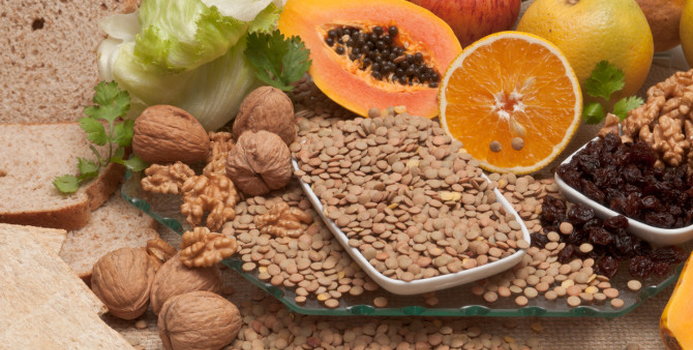Eating enough dietary fiber is important to stay healthy, feel your best, and maintain a healthy weight. Twenty-one - 38 g of fiber per day is the recommended amount you should shoot for. If you're a woman age 51 or older you need 21 g per day; women age 50 or younger should aim for 25 g per day. If you're a man age 51 or over you'll need 30 g per day; men 50 and younger need 38 g per day. Fiber is found in fruits, vegetables, whole grains, legumes, high fiber cereals, popcorn, nuts, and seeds. It's hard to know if you're eating enough fiber, but there are a few signs to watch out for that could signal your fiber intake is too low.
1. You're Always Constipated
If you're always constipated, increasing fiber in your diet might be the solution for you. Since fiber adds bulk to your stool and increases food transit time through your digestive track, a high-fiber diet will help keep you regular. There are other causes of constipated such as medications you're taking, dehydration, lack of physical activity, irritable bowel syndrome, or being pregnant; however, increasing your fiber intake should still help decrease the constipation.
2. You're Always Hungry
Soluble fiber helps slow digestion making you feel fuller longer. If you find yourself constantly craving snacks throughout the day, increase the fiber in your meals and snacks to keep you satisfied longer. Try increasing your fruit, vegetable, and whole grain intake, or eating a high fiber snack, such as an apple, carrots and dip, almonds, or popcorn (without the butter). This will also help you maintain a healthy weight.
3. You're Overweight
If you're overweight you may not be eating enough high-fiber foods. Foods that are high in fiber, such as fruits, veggies, and whole grains, tend to be healthier than low-fiber foods. Since high-fiber foods help to keep you fuller longer, they are essential if you're trying to lose weight. High-fiber foods also typically require a longer chewing time causing you to eat more slowly which gives your body time to register that it's full. This can help prevent overeating.
4. You Don't Eat Many Fruits, Vegetables, or Whole Grains
If you currently don't consume many fruits, vegetables, or whole grain you're likely not getting enough fiber in your diet. These foods provide the majority of dietary fiber for most people. There are other high fiber foods to choose from however fruits, veggies, and whole grains are an essential part of a healthy diet and maintaining a healthy weight. Fiber supplements are available, but getting your fiber from foods is more desirable; always ask your doctor before taking a fiber supplement.
5. Your Dietary Fiber is too Low
If your daiiy dietary fiber intake is too low, then, of course, you need more fiber. There is a way to know for sure how much fiber you're currently eating and if you're getting the recommended daily amount. You can sign up for the FitDay's free online diet journal that will allow you to track and view the nutrition content (including fiber) of your current diet. The FitDay online diet journal will also help you set and track your food, exercise and weight goals.



